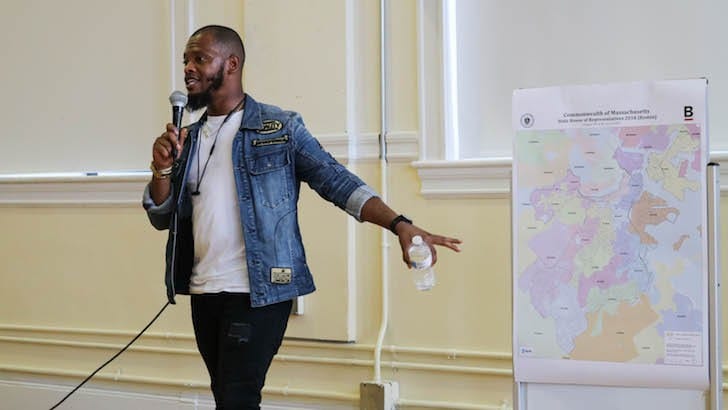
A reinvigorated push for political accountability this election season
In February 2016, James Mackey attended an event at the Massachusetts State House billed as Young Adults in the Criminal Justice System: Taking a Developmental Approach. Watching from the crowd that day, he noticed that few other people of color were in attendance, while none spoke on the panel.
“You had no persons of color on the panel [speaking about] how they are incarcerating so many young people of color, and targeting, and hyper-policing, hyper-criminalizing young people of color,” Mackey says. “It upset me, and so I told the young folks that were with me if you feel a certain way about it, you should say something to the audience, which they did.”
Frustrated with the scene on Beacon Hill, Mackey says he built on lessons he learned as a community organizer for 10 years and founded #StuckOnReplay that July to address institutional racism. After having some success connecting politics and people, he took a hiatus in 2017 but relaunched earlier this month with an event in Roxbury.
“It’s election season, and so we want to make sure that we start holding elected officials accountable because … a lot of laws, policies, and practices are still crippling and criminalizing black and brown communities,” Mackey says, adding that his goal is to “challenge these systems of oppression that have taken advantage of us so we can create change for ourselves and for the betterment of our community.”
Since #StuckOnReplay’s launch in July 2016, it has hosted more than 30 events throughout Boston, partnering with various community organizations. The relaunch event, co-hosted by the Center for Teen Empowerment and Violence in Boston, focused on local, state, and federal organizing to influence policy and hold officials accountable.
“We can influence them all we want, but they still will be making decisions on our behalf without us,” Mackey said at the event, held at City on a Hill charter school near Dudley Square.
Other speakers came from orgs including Violence in Boston, ACLU Massachusetts, City Life/Vida Urbana, Boston Teachers Union, and Massachusetts Senior Action Council, and all zeroed in on social justice and young people. Carrie May, an organizer at Teen Empowerment, told participants the youth are often overlooked.
“Sometimes people forget, especially politicians forget, the largest demographic in our city,” May said. “The youth are being impacted by all these policies. … It’s hard for me to stay motivated. … How are you supposed to be motivated when the education system that lacks a lot of resources, that lacks a lot of books … how are you supposed to become the people of the future?”

Along with others, Mackey noted the significant achievement gap for children of color, who are hurt more than their white peers by cuts to the Boston Public Schools budget.
“[In] our neighborhoods, it feels like … luxury apartments [are being built] faster than Donald Trump tweets,” said Kurt Faustin, a motivational speaker. “JP, Roslindale, Roxbury, and Mattapan … rent prices are going up. Homelessness is still a huge issue in our city. We are getting kicked out. … It feels as though we are homeless in our own city. So once again my question is, who do we value?”
Jamie Kennedy first got involved with Bikes Not Bombs as a 13-year-old, and is now a community action coordinator there. Kennedy works directly with young people who come from marginalized communities and said that places like Bikes Not Bombs are important refuges.
“[In] almost every conversation with every youth I’ve heard stories of [being] racially oppressed in a variety of ways, whether that be in school, whether that be feeling like a prisoner in your neighborhood,” Kennedy said. “It’s painful to hear and it’s painful to see they really do feel like they’re being watched by the police, being brutalized by the police … Most of these kids’ homes, they’ve been raided. They’ve been constantly degraded by the police, they’ve been called out to by the police even though the police shouldn’t know their name.
“I think a lot of the youth before they get into Bikes Not Bombs or some other community organization, there’s a lot of pessimism.”
Kennedy added that many youth of color express discomfort at school. In Massachusetts classrooms, only 8 percent of teachers were nonwhite in the 2016-17 school year. Black youth are also disciplined, expelled, and suspended at four times the rate of white youth.
The issue of policing people of color extends far outside of the classroom walls. According to the ACLU, in Massachusetts, black people are almost over three times more likely to be arrested for possessing marijuana compared to their white counterparts.
“We need to stop being stuck on replay with this cycle of mass incarceration, this cycle of hyper-criminalization, and this cycle of, you know, systems of oppression that continues to criminalize … black and brown communities,” Mackey said.
Bringing specific examples, Monica Cannon-Grant, founder of Violence in Boston, pointed to a recent Washington Post article that found a large gap between arrests for homicides with white victims (90 percent) compared to those with black victims (42 percent).
“The African-American community is victimized … even though [Boston] police have been praised nationally,” Cannon-Grant said. “Two days ago, three people shot in Mattapan … this happens in communities of color.
“Progression in Boston means white progression. Right now it’s an election season. I need you guys to pay attention.”
Kennedy, who is also a part of BosCops, an organization that challenges police power, said the BPD runs a discriminatory 10-point gang database.
“It’s bullshit,” Kennedy said. “You get two points if you’re seen with anyone who’s considered a gang member. This is all dictated by where you live, who you hang out with, what you look like.”
Fatema Ahmad, deputy director of Muslim Justice League, has lived in Roxbury and Dorchester, and said her neighbors have frequent traumatic run-ins with the cops.
“The Boston Police Department is just like every other police department in this country. … A fundamental aspect of their work is racially profiling people and really focusing on marginalized communities. … It is sort of a violent response to marginalized communities instead of actually getting at the roots of why there’s crime and violence within certain communities.”

Ahmad added: “Even in a place that people think is supposedly progressive, all of these things are actually happening. In fact, because people think this is a progressive place, they don’t necessarily pay as much attention to what’s happening.
“The [Department of Homeland Security] program Countering Violent Extremism, it uses a lot of language to hide the fact that it’s a soft surveillance program, to hide that it’s criminalizing Muslims. Boston is one of the leaders of that program.”
With the #StuckOnReplay relaunch, Mackey said his team will try to help educate the community about critical issues like public safety, senior concerns, education, and housing, and encourage people to harness their power—both voting power and grassroots-level organizing.
Ahmad said that organizations like #StuckOnReplay that demand for elected officials to be held accountable are “really necessary in cities like Boston that call themselves progressive.”
“[We] can never just rely on them [elected officials],” Ahmad said. “We have to be able to back it up with community support and to really show them this is what the community wants, this is what the community is saying, to the point where to have to do something about it. It’s difficult to hold people accountable once they’re elected.”
“A lot of folks don’t know about what these specific roles mean and how these specific roles within local, state, and federal level affect them,” Mackey said. “There are so many different positions that are up for grabs, all of these positions through Suffolk County that folks don’t know anything about.
“They may see fliers or posters or banners or folks that are running for specific positions and get their register to vote. They may just go and write folks’ names in that they see. But do they have an opportunity to really meet and greet with these folks? To have a conversation with these folks around the issues that they are dealing in reference to the housing, in reference to education, in reference to public safety?
“It has to happen now. ”
Olivia Deng is an arts and culture writer who also covers politics and social movements. Her work has appeared in DigBoston, WBUR, Boston Magazine, The Atlantic, Boston Art Review and more. She is also an illustrator and painter.

